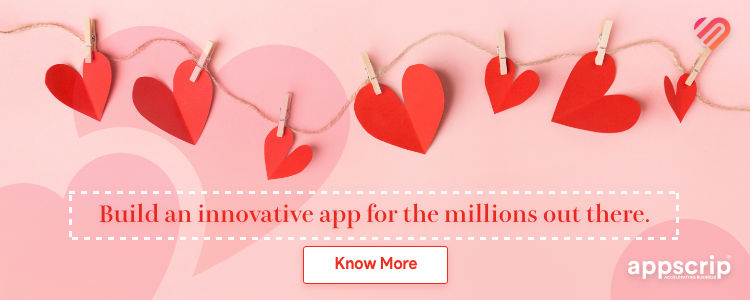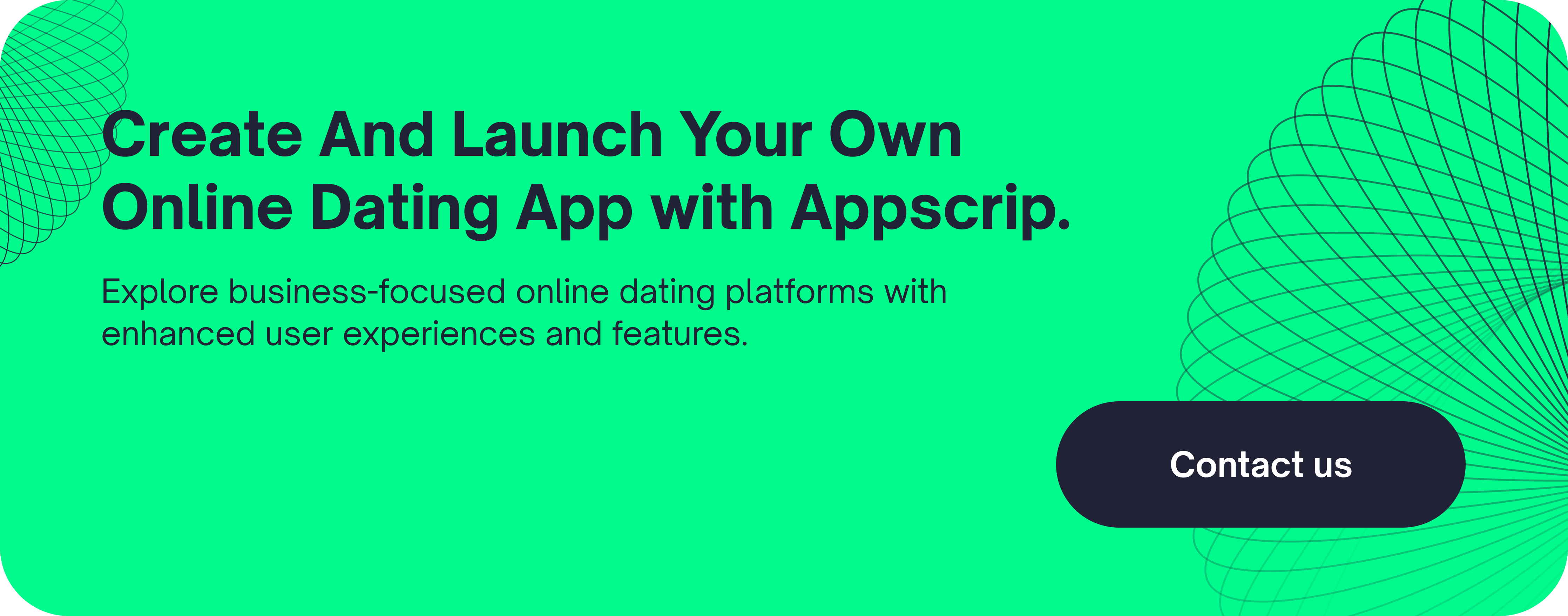The dating app market has become a thriving and dynamic space, offering a unique opportunity for entrepreneurs to create innovative platforms that redefine how people connect and form relationships.
In this blog, we’ll explore the lucrativeness of the dating domain for entrepreneurs and provide detailed information on how to make an app like Tinder.
How to Make a Dating App Like Tinder?
Being aware of latest user trends and the newest technologies are imperative when developing a dating app similar to Tinder. To protect user privacy and security, include contemporary matching algorithms, sophisticated design elements, and strong security measures.
Entrepreneurs or businesses looking to build a dating app have three approaches:
- Native app development
- Web app development
- Hybrid app development
| Characteristics | Web app | Hybrid app | Native app |
| Usage | Access directly from a browser | Have to install the app on their device first | Have to install the app on the device |
| Internal working | Client code communicates with remote server-side code / databases | Client code and browser code are wrapped in a native shell / container | Client code written in language specific to the device / platform |
| Native device features | Not accessible | Accessible | Accessible |
| User experience | Inconsistent & dependent on the browser used | Consistent and engaging | Consistent and engaging |
| Access | Limited by browser and network connectivity | One-step access with offline features | One-step access with offline features |
| Performance | Slower and less responsive | Faster, but may use more battery power | Performance can be optimised to device |
| Development | Cost-efficient, quick time to market | Cost-efficient, quicker time to market | Expensive, higher time to market |
Cost and timeline to build a dating app like Tinder
| Country/Region | Pricing – $ | Timeline (Months) |
| Newyork, USA | 90-350K | 4 – 8 |
| Kyiv, Ukraine | 70-150K | 4 – 5 |
| Croatia | 330-500K | 6 – 9 |
| Philadelphia, USA | 100-500K | 4 – 8 |
| Hanoi, Vietnam | 57-60K | 5 – 18 |
| India | 20-50K | 5 – 9 |
How to Monetise A Dating App Like Tinder?
There are various monetisation strategies that entrepreneurs or businesses can incorporate while designing an app like Tinder. Popular monetisation strategies you can inculcate while designing a dating app like Tinder are:
Advertising – this is an universally accepted formula on how to monetise an app. You can integrate ads in the app and can charge on ads view, click-through rate, etc.
Freemium model – this monetisation strategy too is widely used. While the basic app is free to use, premium features can be subscribed by paying for it.
In-app purchases –This feature gets you revenue via commission that companies pay you for the sales they generate through your app.
Account boost – this paid option is for users interested in promoting their account so as to show-up more often in search results.
Sponsorships – this monetisation strategy can be introduced after an app gains popularity.
What Are Clone Apps
Mobile apps known as clones are developed by incorporating similar features and functionalities of an already existing app. Clone applications are frequently made by companies seeking to cash in on the success of an existing app or those planning to modify an app that has a huge number of users.
Reasons why entrepreneurs build a clone app:
- To capitalise on the success of an existing app.
- So as to create a customised version.
- To test latest features and functionalities.
There are several advantages that comes along when you build a clone app.
- Reduced development costs.
- Reduced development time.
- Existing user base.
- Quick time to market.
Here we compare the various facets of a clone app against a custom app:
| Feature | Clone App | Custom App |
| Cost | Relatively lower cost | Higher cost |
| Time To Market | Quick deployment due to the existing framework | Longer development time |
| Tech Stack | Clone apps may lack support for modern technologies like Kubernetes, Docker, etc. | Custom apps can incorporate modern tech seamlessly, including support for Kubernetes, Docker, and more |
| Maintenance & Support | Clone apps typically focus on selling the product, with limited post-sales support | Custom apps often provide comprehensive post-sales support and assistance |
| Code Quality | Code in clone apps might exhibit lower quality, with limited readability and documentation | Custom apps are built with a focus on code quality, readability, and extensive documentation |
| Scalability | Clone apps may have limitations in terms of scalability due to their design choices | Custom apps are designed to be scalable and can handle |
How to Make An App Like Tinder: Exclusive Features
| Features | Details |
| Random Video Dating | Users swipe to connect with random users for live video calls |
| Speed Dating | Users can engage in hour-long speed-dating events, connecting with multiple potential matches in 5-minute call duration. |
| Boost Profile | Users can increase visibility by boosting their profile for better viewership |
| Advance Filters | Users have to answer certain questions for better matching and filtering |
| Video Date | Users set audio / video dates with matched users or a physical date |
| Video Profile | Boost trust and authenticity via videos on user profiles |
| Face Verification | Users must undergo face verification, ensuring authenticity and preventing fake accounts |
| Send Gifts & Coins | Users can send coins as gifts to matches and prospects, along with personalised notes |
| Integrated Chat Engine | Effortless and seamless interaction with our in-built chat engine, enhances user engagement. |

Key Steps on how to make an app like Tinder
Dating apps have changed how folks meet and connect with others. Developing a successful dating app requires coding skills, understanding what users need, and the knowledge of how to monetise an app. To create an app that resonates with users, follow these steps:
Market Research and Target Audience
Entrepreneurs must fathom user demographics, preferences, and behaviour patterns to identify gaps in the market. Defining a target audience and creating detailed user personas will guide the app’s development process.
Defining Unique Selling Points (USPs)
Successful dating apps are distinguished by their unique features and functionalities. Analyse existing apps to identify gaps and opportunities. With clear and compelling USPs carve out a niche, attracting users with something fresh.
Choosing the Right Technology Stack
The backbone of any dating app lies in its technology stack. Informed decisions on the technologies are imperative for factors such as scalability, security, and user experience.
| Category | Options |
| Backend | Node.js or Go or Python |
| DevOps | Deployment via Docker + K8 |
| Architecture | Microservices work well when application functionality is divided into logical divisions, such as notifications (SMS, Email, Push), chat, webRTC calls, search, and streaming. |
| App | Built on Flutter- Works great for iOS and Android |
| Website | Flutter- A Flutter web app is ideal for building a PWA for dating platforms that require a login, serving both web and mobile web users efficiently. |
| Database | MySQL or PostgreSQL or MongoDB |
| Real-time Chat | Comet Chat or Sendbird Or Isometrik (new) |
| Calling | WebRTC powered via Agora, Sendbird, Twilior or Isometrik |
| Push Notifications | Firebase Cloud Messaging (FCM), Apple Push Notification Service (APNS) |
| SMS | Powered via Twilio |
| To streamline email, push, and SMS functionalities, utilizing services like SendGrid or Novu can be an effective choice. | |
| Payment Gateway | Stripe, PayPal |
| Geolocation | Google Maps API |
| Analytics and Crash Reporting | Firebase, Clevertap, and App Analytics via Looker or custom analytics dashboard |
Designing an Intuitive User Interface (UI)
- Importance of a user-friendly interface in dating apps
Users love a user-friendly interface. This is crucial in ensuring that users can navigate the app effortlessly. A clean, visually appealing UI enhances the overall user experience.
- Incorporating engaging design elements
Beyond functionality, incorporating engaging design elements can set your dating app apart. Thoughtful use of colours, fonts, and interactive features can create a visually appealing environment.
Implementing Geolocation Features
- Integration of geolocation for real-time user matching
Geolocation is a cornerstone feature in successful dating apps, enabling real-time user matching based on proximity.
- Enhancing user experience through location-based services
Geolocation enhances overall user experience. From suggesting nearby date spots to facilitating location-based events, thoughtful use of location services adds value.
Building a Matching Algorithm
- Understanding the science behind successful matching algorithms
Matching algorithms are the heart of any dating app, influencing the quality of matches and user satisfaction. Science behind successful algorithms involves analysing user data, preferences, and behaviours. Consider factors like user interests, demographics, and past interactions to create a sophisticated algorithm.
- Developing a unique algorithm for your dating app
It’s crucial to develop a unique algorithm that sets your dating app apart. Tailor it to your specific niche or USP. A distinctive algorithm enhances the app’s identity and appeal.
Ensuring App Security and Privacy
- Implementing robust security measures
Robust security measures safeguards user information from potential threats. This includes secure data encryption, two-factor authentication, and regular security audits to identify and address vulnerabilities.
- Addressing privacy concerns and ensuring user data protection
Clearly communicate your app’s privacy policy, detailing how user data is collected, stored, and utilized.
Localisation
Ensure your app can be accessed by different cultures and languages. A global approach will help you expand your user base.
Feedback Collection
Maintain a continuous dialogue with your users through surveys, feedback forms, and social media. They should feel heard and valued.
Conclusion
Creating a dating app like Tinder that reverberates with users requires a deep understanding of their desires, continuous innovation, and a commitment to providing a safe and enjoyable platform for finding love and companionship.
In the competitive landscape of dating apps, paying meticulous attention to design, functionality, and user security is key to building a successful and sustainable platform. Each of these elements contributes to the overall user experience, making your app stand out in a crowded market.
As you embark on the journey on how to make an app like Tinder, remember that user satisfaction is the ultimate measure of success.

After an Engineering degree and a Diploma in Management I devoted 16+ years working in the automotive industry. My innate skill and extreme passion in writing, encouraged me to adopt it up as a profession. I have been writing for more than 10+ years in the software industry. The 400+ blogs I published are informative, exhaustive and interesting to a professional and causal reader.









